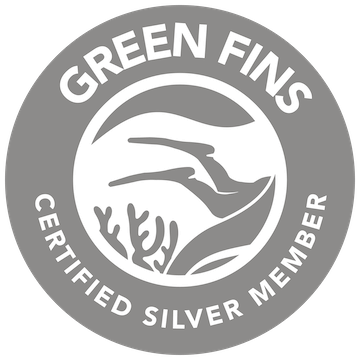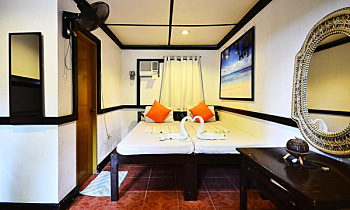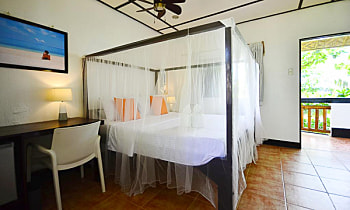Devocean Divers, Malapascua
per room, breakfast only

















Overview

Green Fins silver Member
This resort is committed to sustainable practices. Staying here helps protect the oceans and our natural world. Learn more about Green Fins
- Daily trips to see the most area’s famous resident thresher sharks
- Lovely beachfront setting with rooms set in a tranquil tropical garden
- Green Fins centre involved in marine conservation and community projects
- Fun, family-style atmosphere ideal for outgoing guests and social scuba divers
Devocean Divers offer adrenaline-pumping thresher shark dives, PADI courses, and trips to the region’s hottest dive sites by day - and live music under the stars by night. The resort’s friendly vibes and experienced dive centre provide personal Malapascua Island getaways for divers of all levels. And, offering stylishly-appointed accommodation set amid tranquil tropical gardens, swaying palms, and sparkling white sand, there’s little more you could ask for. With its high standards for safety and fun and a laid back beach atmosphere, Devocean is the ultimate base for exploring Malapascua’s natural beauty both above and below the water.
Rooms

Standard
2 x Twin beds or 1 x double bed, sleeps 2
Air conditioning, Ensuite bathroom, Breakfast...from $61 /night
Superior
2 x Twin beds or 1 x double bed, sleeps 2
Air conditioning, Ensuite bathroom, Breakfast...from $83 /night
Deluxe
2 x Twin beds or 1 x double bed, sleeps 2
Air conditioning, Ensuite bathroom, Breakfast...from $105 /night
Resort checklist
Meal plans:
- Breakfast
Reviews
Leonie v
Devocean was super nice, all of the divemasters were really skilled and friendly. The open water course itself was one on one (I was expecting...
Read moreDiving in Malapascua
- Thresher sharksYear round
- Reef sharksYear round
- FrogfishYear round
- MandarinfishYear round
- SeahorsesYear round
- Exotic NudisYear round
- Plentiful reef lifeYear round
- Caves & cavernsYear round
- ShipwrecksYear round
Malapascua is one of those places that seems to have it all - reliable shark diving, beautiful reefs and wrecks to explore, and some really interesting muck diving. The best dive sites are found at Malapascua’s offshore reefs, including the famous Monad Shoal and the increasingly popular Kimud Shoal. These underwater plateaus rising out of the depths are home to cleaning stations where thresher sharks gather every day. The best time to dive for threshers is often at dawn, when the low light brings the sharks up from the deep water along the reef edge - so expect some early morning starts! If you are lucky, you might even spot some other pelagics, with sightings of tiger sharks and bull sharks increasing around Monad Shoal in particular.
Malapascua Island itself is surrounded by fairly shallow water with plenty of coral patches. Sightings of frogfish, ghostpipefish, pygmy seahorse, smashing mantis shrimp and more are a daily occurrence. These shallow reefs are also perfect for learning and Malapascua is a great choice to complete your PADI dive certification.
Gato Island
Like many other Philippines dive destinations, it is a nearby uninhabited island that offers some of the best diving opportunities - in this instance, Gato Island. You can explore an incredible swim through, straight through the middle of this rocky outcrop, and watch whitetip sharks swimming in and out of the rays of light penetrating the cave system. Gato island also has amazing underwater rock structures and soft corals, along with seahorses and rare nudibranchs. It’s often said you come to Malapascua for the thresher sharks, but leave remembering the diving at Gato Island.
Wreck diving at Malapascua
Malapascua’s favourite wreck is the Dona Marilyn, a Cebu passenger ferry that sank in a typhoon over 20 years ago. The ferry now lies on its starboard side, miraculously in one piece. Draped in coral-encrusted fishing nets, it’s home to marble rays, blue-spotted rays, whitetips and plenty of other fish and critters. Other wrecks include the ‘Tapilon’, an unidentified World War II Japanese cargo carrier sunk by torpedoes and now in several sections. Or the Lighthouse Wreck, a Japanese World War II landing craft, lying in shallow water making it ideal for wreck diving newbies, or as part of a PADI advanced course.



